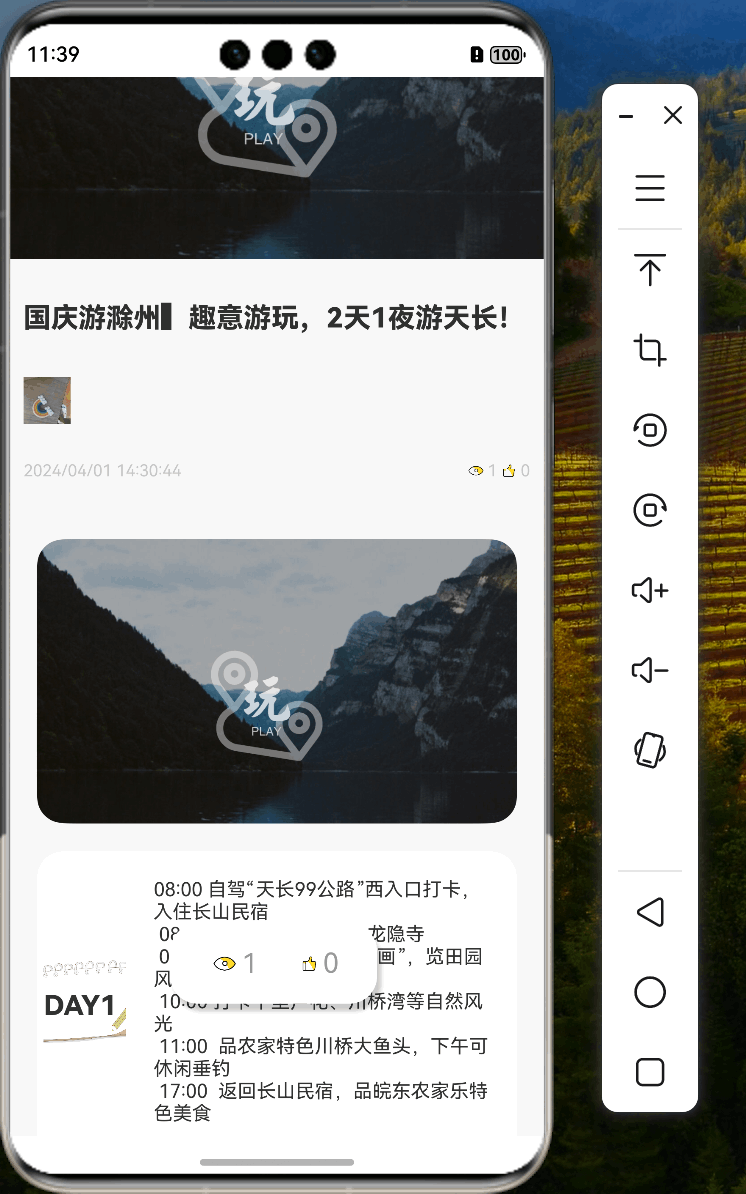#跟着若城学鸿蒙# HarmonyOS应用开发教程:主页面布局与导航栏实现
·

概述
本教程将介绍如何使用HarmonyOS的ArkTS语言实现一个具有底部导航栏的主页面布局。我们将以一个旅游应用为例,展示如何创建一个包含首页、攻略、动态和个人中心四个标签页的主界面。
技术要点
- Tabs组件的使用
- 响应式布局设计
- 状态管理
- 生命周期管理
代码实现
1. 导入必要的模块
import { BreakpointConstants, StyleConstants, Logger, BreakpointSystem } from '@ohos/common';
import { buttonInfo, ButtonInfoModel } from '../viewmodel/MainPageData'
import { PageConstants } from '../constants/PageConstants'
2. 页面结构定义
@Entry
@Component
struct MainPage {
@State currentPageIndex: number = 0
@StorageProp('currentBreakpoint') currentBreakpoint: string = 'sm';
private breakpointSystem = new BreakpointSystem();
}
3. 底部导航栏实现
@Builder
BottonNavigation(button: ButtonInfoModel) {
Column({ space: PageConstants.BUTTON_SPACE }) {
Image(this.currentPageIndex === button.index ? button.selectImg : button.img)
.objectFit(ImageFit.Contain)
.width($r('app.float.main_image_size'))
.height($r('app.float.main_image_size'))
Text(button.title)
.fontColor(this.currentPageIndex === button.index ? $r('app.color.focus_color') : Color.Black)
.fontWeight(StyleConstants.FONT_WEIGHT_FIVE)
.fontSize($r('app.float.micro_font_size'))
}
.width(StyleConstants.FULL_WIDTH)
.height(StyleConstants.FULL_HEIGHT)
.alignItems(HorizontalAlign.Center)
}
关键特性
1. 响应式布局
应用支持不同屏幕尺寸的适配,通过BreakpointSystem实现:
.barWidth(this.currentBreakpoint == BreakpointConstants.BREAKPOINT_LG ?
$r('app.float.bar_width') : StyleConstants.FULL_WIDTH)
2. 页面切换
使用Tabs组件实现无缝的页面切换:
Tabs({
barPosition: this.currentBreakpoint === BreakpointConstants.BREAKPOINT_LG ?
BarPosition.Start : BarPosition.End,
index: this.currentPageIndex
})
3. 生命周期管理
async aboutToAppear() {
this.breakpointSystem.register();
const params = router.getParams() as routerParams
this.currentPageIndex = params.pageIndex ? params.pageIndex : 0
}
aboutToDisappear(): void {
this.breakpointSystem.unregister()
}
最佳实践
- 使用
@StorageProp和@State装饰器管理状态 - 实现响应式设计以适应不同屏幕尺寸
- 合理管理组件生命周期
- 使用Builder装饰器封装可复用的UI组件
总结
通过本教程,我们学习了如何使用HarmonyOS提供的UI组件和状态管理机制实现一个功能完整的主页面。这些知识将为开发更复杂的HarmonyOS应用打下坚实的基础。
更多推荐
 已为社区贡献102条内容
已为社区贡献102条内容








所有评论(0)